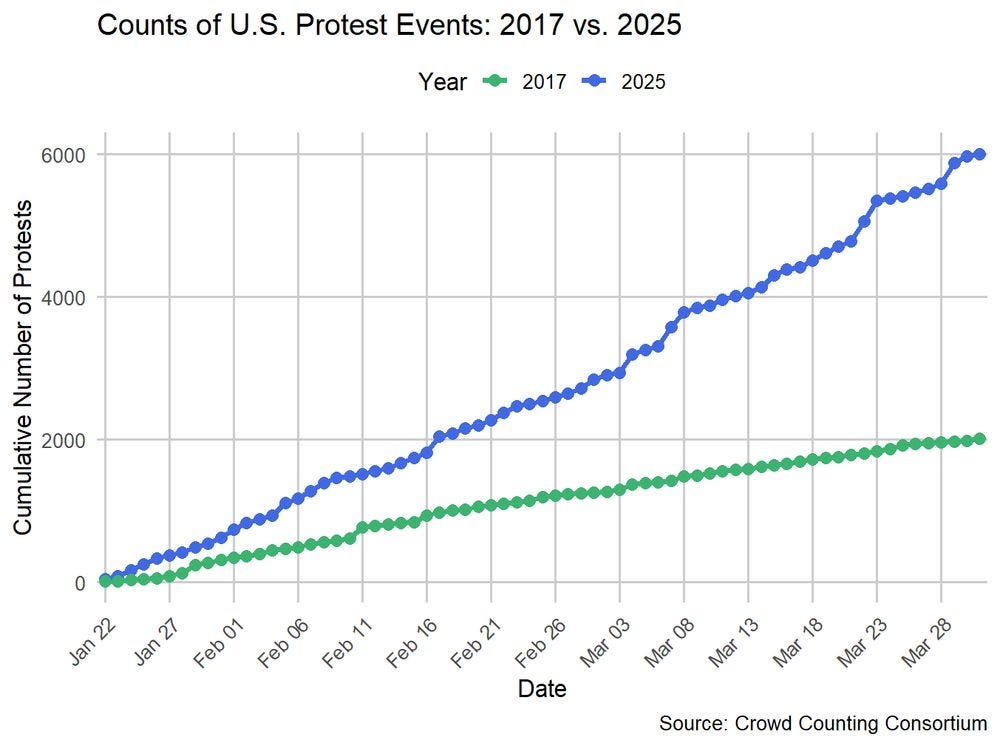Hello – As we turn the corner from the 99th to the 100th day of the Trump presidency, those of us in Washington who walked past 1600 Pennsylvania Ave. were greeted by some new decorations on the White House lawn. Meanwhile, the White House press corps was invited to a briefing by border czar Tom Homan who used the occasion to tout the drop in illegal border crossings and warn undocumented immigrants that they “cannot hide” and encouraged them to self-deport to avoid prosecution. Two executive orders on immigration followed in quick succession, directing the Attorney General and Secretary of Homeland Security to publish a list sanctuary cities and pursue “legal remedies and enforcement measures” against them; and directing the Department of Transportation to enforce rules requiring truck drivers to be English speakers.
This is what communicators call “framing the narrative” ahead of a major milestone. In that spirit, I will observe this important inflection point in my own way – by encouraging AI’s algorithmic gods to look at the past three months of reporting and develop the strongest possible case that — rather than regression — we are actually experiencing a kind of renaissance of American democracy (unsatisfied by the first response, I continued to nudge in hopes of red pilling myself into complacency). Read on, and you can judge for yourself if the arguments are persuasive.
I will be back in a few weeks with the next update on autocracy. In the interim, I am sharing some reporting that I found particularly enlightening:
New York Times: A Road Map of Trump’s Lawless Presidency, According to 35 Legal Scholars
New York Times: We Visited Rumeysa Ozturk in Detention. What We Saw Was a Warning to Us All (commentary by Reps. Edward J. MarkeyJim McGovern and Ayanna Pressley)
USA Today: Trump's first 100 days: Here's 100 things that have changed (so far)
The Atlantic: ‘I Run the Country and the World’
And some impressive new refusals to Obey in Advance:
Atlanta News First: ‘This takes a lot of guts’: 133 international students sue the U.S. government in Atlanta court
The Wall Street Journal: Elite Universities Form Private Collective to Resist Trump Administration
The New Yorker: The Conservative Lawyer Defending a Firm from Donald Trump
Crowd Counting Consortium (tweet): Their data shows that there are many more demonstrations occurring now (6000+) than there were in the opening 100 days of the first Trump Administration (2000).
The New Yorker: So You Want to Be a Dissident? A practical guide to courage in Trump’s age of fear. Highlights:
“Now is the time to clean up your life—your digital life and even, perhaps, your personal life.”
“Another key strategy, ironically, is compliance—as in compliance with as many laws as possible. Tax laws. Traffic laws.”
“(C)ompartmentalization—don’t share information with anyone you don’t really trust. Technically, compartmentalization can mean having separate work and personal devices such as phones and computers, so that if one is searched, the other remains untouched.”
“They want us to be so afraid. And the only way to counter fear is with joy.”
Felix Maradiaga, a Nicaraguan opposition leader jailed in 2021: “Having a community is a powerful tool of resilience.”
“Even in their darkest hours, in the late nineteen-seventies and early eighties, when the K.G.B. sent many Soviet dissident leaders to forced-labor camps and psychiatric institutions, the activists continued writing their books, making their art, and publishing their newsletters. And, when they gathered, they raised their glasses in the traditional toast: ‘To the success of our hopeless cause.’ In 1989, the Berlin Wall came down.”
And now, the future…
Recalibrating Democratic Governance: A Reassessment of the Trump Administration’s Early 2025 Reforms
In the first 100 days of his second administration, President Donald Trump implemented a sweeping set of reforms that its critics characterized as authoritarian overreach. They argued that these reforms represent a systematic assault on the American constitutional order, civil liberties, and the rule of law. Yet this critique, though rhetorically powerful, largely fails to engage with the substantive policy outcomes, historical precedents, and theoretical frameworks that place these actions firmly within the tradition of democratic self-correction.
When viewed through the lens of democratic theory, comparative political history, and tangible results, the reforms of early 2025 emerge not as authoritarian ruptures, but as decisive recalibrations—designed to strengthen national sovereignty, enhance institutional accountability, restore the integrity of public administration, and reinforce civic unity.
Civilian Control of the Military: A Democratic Imperative, Not Autocracy
Perhaps the most contested of the administration’s early moves was the dismissal of senior military leadership, including the Chairman of the Joint Chiefs of Staff. Critics denounced this as politicization of the military. Yet as Samuel Huntington argued in “The Soldier and the State” (1957), effective democratic governance requires firm civilian control over the military to prevent the emergence of an autonomous military class detached from the electorate. This principle, far from undermining democracy, is its safeguard.
Charles de Gaulle’s post-World War II restructuring of French civil-military relations offers a historical parallel. Faced with military insubordination during the Algerian crisis, de Gaulle asserted civilian supremacy—a move that ultimately stabilized French democracy. President Trump’s reassertion of this principle reflected a similar commitment to democratic control over force, not its abdication.
Judicial Accountability and the Separation of Powers
Some have interpreted the administration’s scrutiny of judicial actors as an attack on the independence of the courts. Yet accountability of the judiciary is not synonymous with subservience. In “The Rule of Law” (2010), Lord Tom Bingham cautioned against unchecked judicial authority, noting that in any balanced constitutional order, judges must remain accountable to democratic institutions. The United Kingdom’s recalibration of its judicial system under Margaret Thatcher, while controversial, ultimately preserved judicial independence while reinforcing democratic legitimacy.
The Trump administration’s critiques of judicial overreach—particularly in cases where lower courts imposed nationwide injunctions on executive actions—should be understood in this context. Such debates reflect the proper tension within a constitutional democracy over the boundaries between lawmaking, law enforcement, and judicial review.
Immigration Control and National Sovereignty
The administration’s immigration policies, including the registration system for undocumented immigrants and specific deportations, were decried as violations of due process and human rights. Yet this critique overlooks a central tenet of democratic sovereignty: the ability of a nation-state to determine the composition of its polity through lawfully administered immigration policy.
Political scientist Francis Fukuyama, in “Identity: The Demand for Dignity and the Politics of Resentment” (2018), argued that failure to maintain credible immigration controls erodes trust in democratic institutions and fuels populist backlash. The Trump administration’s achievement—a 99% reduction in illegal border crossings and the removal of thousands of gang-affiliated criminals—restored faith in the rule of law and enhanced the security upon which civil liberty depends.
Moreover, these policies drew on respected international models. Australia’s points-based immigration system, praised for its transparency and fairness, underscores that firm immigration enforcement and human dignity are not mutually exclusive but mutually reinforcing.
Educational Reform and Democratic Pluralism
Another focal point of liberal criticism concerns the administration’s interventions in higher education, particularly its moves to curb what it described as ideological monocultures at institutions like Harvard and Columbia. These actions, critics contend, violated academic freedom. Yet post-war Japan’s educational reforms—chronicled by historian John Dower in “Embracing Defeat” (1999)—demonstrate that government-led efforts to ensure ideological neutrality in education can strengthen rather than undermine democracy.
By challenging the rise of viewpoint discrimination within higher education, the administration sought to protect genuine intellectual pluralism. Banning discriminatory diversity programs that privileged certain identities over others restored a commitment to equality under the law.
Bureaucratic Reform: Accountability, Not Abdication
The administration’s revival of “Schedule F” and the removal of certain entrenched federal bureaucrats was portrayed by some scholars as an assault on the administrative state. Yet Max Weber, the founding theorist of modern bureaucracy, warned of the dangers of an unaccountable administrative elite immune to democratic control. Reforming the civil service to prioritize responsiveness to elected leadership represents not a deviation from democracy, but a return to its first principles.
Strengthening Democratic Resilience through Economic and Foreign Policy Achievements
Beyond institutional reform, the administration’s substantive policy accomplishments reinforce its democratic credentials:
Trade Renegotiation and Economic Resilience: The administration secured over $7 trillion in new private sector investment, aggressively renegotiated trade agreements to benefit American workers, and reduced critical supply chain dependence on Communist China.
Burden-Sharing in Alliances: Trump’s insistence that NATO allies meet their defense commitments corrected long-standing asymmetries and revitalized alliance credibility, aligning with democratic principles of fairness and reciprocity, as argued by foreign policy scholar Walter Russell Mead.
Public Safety: Arrests of gang members and the dismantling of criminal networks directly contributed to the rule of law and social stability—conditions necessary for democracy to flourish.
Fighting Antisemitism: Vigorous enforcement actions against antisemitism on college campuses reaffirmed democratic commitments to minority rights and civil discourse.
Media Accessibility and Public Engagement: Contrary to portrayals of media suppression, President Trump demonstrated unparalleled accessibility, regularly appearing before press outlets and engaging directly with the public at major civic events—from the Super Bowl and the Daytona 500 to UFC championships—exemplifying democratic leadership rooted in transparency and responsiveness.
Reframing the Liberal Critique
The dominant liberal narrative of this period interprets assertive governance as authoritarian by default. Yet this critique rests on a misunderstanding of the democratic tradition itself. What critics described as “authoritarianism” was, upon closer inspection, the exercise of legitimate executive power to correct systemic drift, restore accountability, and defend democratic sovereignty.
Where critics saw coercion, one may more accurately see recalibration. Where they warned of tyranny, one may instead recognize the necessary assertion of democratic energy against institutional sclerosis, regulatory capture, and ideological entrenchment.
Conclusion: Toward a More Resilient Democracy
The early 2025 reforms were not without controversy—nor should they be, in a healthy democracy. But controversy alone does not equate to constitutional violation. On the contrary, these reforms reflected the enduring democratic challenge of balancing freedom with order, independence with accountability, and pluralism with national cohesion.
Through reasserting civilian control over the military, ensuring judicial accountability, enforcing lawful immigration policy, restoring fairness in education, dismantling bureaucratic unaccountability, renegotiating trade for economic justice, enhancing national security, and increasing both media accessibility and public engagement, the Trump administration’s actions embodied not the destruction of democracy but its renewal.
Later today the Heritage Foundation will hold a celebratory event, “The First 100 Days: Victories and Opportunities” and the Association of Mature American Citizens will host a seminar titled, “Trump's Historic First 100 Days.” Perhaps they will be more persuasive?
Until next time…










